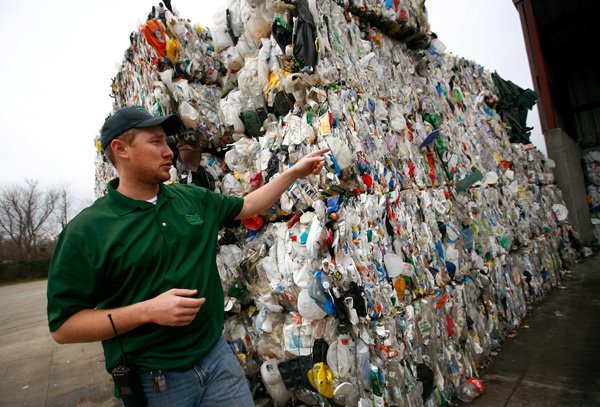FAYETTEVILLE — Residents won't be able to recycle yogurt cups and butter tubs at the Happy Hollow Road drop-off facility until city officials find a new buyer for No. 3 through 7 plastics.
The Solid Waste and Recycling Division began accepting No. 3 through 7 plastics in late 2011 only at the drop-off but had no place to send the material when Preferred Waste Solutions of Pryor, Okla., closed last summer.
At A Glance
Plastics
The bottoms of most plastic containers are labeled with an identification number inside a triangular recycling symbol. The numbers denote what type of material each container is. The identification system was introduced in 1988 by SPI, the plastics industry trade association.
• No. 1: PET (Polyethylene Terephthalate), soft drink, mouthwash and water bottles; peanut butter jars; and ketchup and salad dressing containers
• No. 2: HDPE (High Density Polyethylene), milk jugs; shampoo bottles; and containers for laundry detergent and other household cleaners
• No. 3 : PVC (Polyvinyl Chloride), blister packs; shrink wrap; wire and cable insulation; and tamper-resistant containers
• No. 4: LDPE (Low Density Polyethylene), produce and newspaper bags; hot and cold beverage cups; toys; and honey and mustard bottles
• No. 5 : PP (Polypropylene), yogurt cups; butter tubs; medicine bottles; and syrup containers
• No. 6: PS (Polystyrene), meat and poultry trays; protective foam packaging; and CDs
• No. 7: Other, 3- and 5-gallon reusable water bottles; oven-baking bags; and custom packaging.
Sources: American Chemistry Council, Plastics Division; Environmental Protection Agency
“The domestic market for these materials is really hit or miss,” said Brian Pugh, waste reduction coordinator.
Sanitation workers leave No. 3 through 7 plastics in curbside recycling bins. The items include mustard and medicine bottles; meat and poultry trays; and bags used to wrap produce and newspapers.
The city collects No. 1 and 2 plastics at the drop-off and at the curb. Pugh said No. 1s and 2s can easily be converted back into milk jugs, 2-liter bottles and other products. And, he added, there’s much more of demand for them than No. 3 through 7 material.
Most companies either throw those plastics away or bundle and ship them overseas to places such as China, Pugh said.
“You have no idea what happens once they go over there,” he added.
That makes things difficult for the city.
City Council members approved a resolution in January 2011 requiring the Solid Waste and Recycling Division to clearly document where all material goes and how they are recycled.
“Don’t use my tax dollars and say something’s being recycled unless it’s actually being recycled,” said Louise Mann, who owns a waste consulting company and pushed for the 2011 resolution.
Pugh said the city sent 2.6 tons of plastic to Preferred Waste Solutions before the company closed. He said, since then, the city has stockpiled 20 tons of material outside the Recycle Center on Happy Hollow Road.
Pugh said city officials won’t resume collections until two buyers are lined up — one as a primary purchaser and one as backup.
“We don’t want to be in the same position again,” Pugh said.
The Boston Mountain Solid Waste District also stopped taking No. 3 through 7 plastics last year at drop-off facilities in Elkins, Elm Springs, Winslow and West Fork after Preferred Waste Solutions closed.
“There wasn’t a sustainable, reliable market that we felt the items were truly being recycled,” said Robyn Reed, district director.
Officials for two private recycling companies in Northwest Arkansas said they can recycle the plastics.
Ron Whaley, CEO of NextLife Asset Recovery Services, which recently opened a processing facility in Rogers, said, “We own the technology that allows us to clean waste and sell it to large producers that turn it back into toothbrushes, toys and food items.”
Pugh said he has plans to meet with NextLife officials next week.
Jordan Johnson, a spokesman for Waste Management, which has contracts with Springdale, Centerton and Farmington, said the company accepts all plastics and takes them to be recycled at a Marck Industries facility in Rogers.
Mike Wilson, a sales manager at Marck’s corporate office in Cassville, Mo., said Friday the company has to recycle all plastics it receives.
“We can’t afford to just throw stuff away,” Wilson said.
He and Johnson said they were unable to provide documentation on how the material is recycled.
Mann said, until Fayetteville is able to resume collection, residents should pay attention to the way the products they purchase are packaged or find a way to reuse containers they buy.

